Biodiversity
Policy and Basic Approach
Sojitz handles food resources, marine resources, forest products, and the company’s business activities also span resource development and plant construction. We therefore recognize the importance of protecting and maintaining biodiversity that supports the ecosystems of the forests, oceans, and rivers that serve as the processing sites, mining sites, or places of origin for products.
In recent years, corporate biodiversity initiatives have received growing international attention. At the same time, stakeholders’ expectations for Sojitz have increased, and Sojitz sees conserving biodiversity as essential for sustainable business management and raising its corporate value as the Sojitz Group.
Sojitz Group has set initiatives for protecting biodiversity as one of its Materiality(Key Sustainability Issues) under “Environment” and included the preservation of biodiversity in its Sojitz Group Environmental Policy.
Read more
Biodiversity issues vary in severity depending on the region and sector, and Sojitz establishes policies to specifically target businesses in regions and sectors with biodiversity-related risks.
Read more
Goals and Targets
Overall Target
By preserving biodiversity, we will strive to minimize the environmental burden of our businesses.
Specific Targets
Wood Procurement Initiatives
Sojitz recognizes various issues regarding imported wood, such as threats to biodiversity in certain areas. Sojitz Group is working together with each supplier to monitor and improve the legality of logging practices as well as promote consideration for the environment and society in areas where logging takes place, as outlined in the Sojitz Wood Procurement Policy. Specifically, Sojitz has set the following quantitative targets.
Quantitative Targets
Sojitz Group will ensure that by FY2025, 100% of the wood we handle is either certified wood (Level A), or wood that has not been certified, but that we have verified as being procured through environmentally conscious methods (Level B).

- Definitions for each level
Wood was evaluated for 1) traceability back to the place of origin and 2) suitability of forest management, after which it was sorted into one of the following four levels.
Level A:Wood confirmed to be certified wood (*) or wood confirmed to have a high level of management equivalent to certified wood
Level B:Wood which has not been certified, but for which we have verified both traceability and suitability of forest management (i.e. that the forest is subject to environmentally and socially conscious forest management)
Level C:Traceable wood
Level D:Wood lacking traceability
- Wood certified under FSC®, PEFC, etc. FSC®-certified wood is given the highest score.
Read more
Systems
Systems
Measures to address the environment, including biodiversity, are deliberated by the Sustainability Committee. These policies and initiatives may then be put into action following a report to the Management Committee and Board of Directors, and the Board of Directors acts as the supervisory body providing directives on these policies.
Deliberation on all business investments and loans require projects to be analyzed and evaluated for risks to the environment and to society including biodiversity risks. A project’s value must be confirmed from a sustainability perspective prior to resolution.
The Investor Relations & Corporate Sustainability Dept. is a dedicated body that supports the entire deliberation and evaluation process and is in charge of implementing directives from the Sustainability Committee. The office reviews all investment and loan proposals discussed by the Finance & Investment Deliberation Council from a sustainability perspective, including biodiversity.
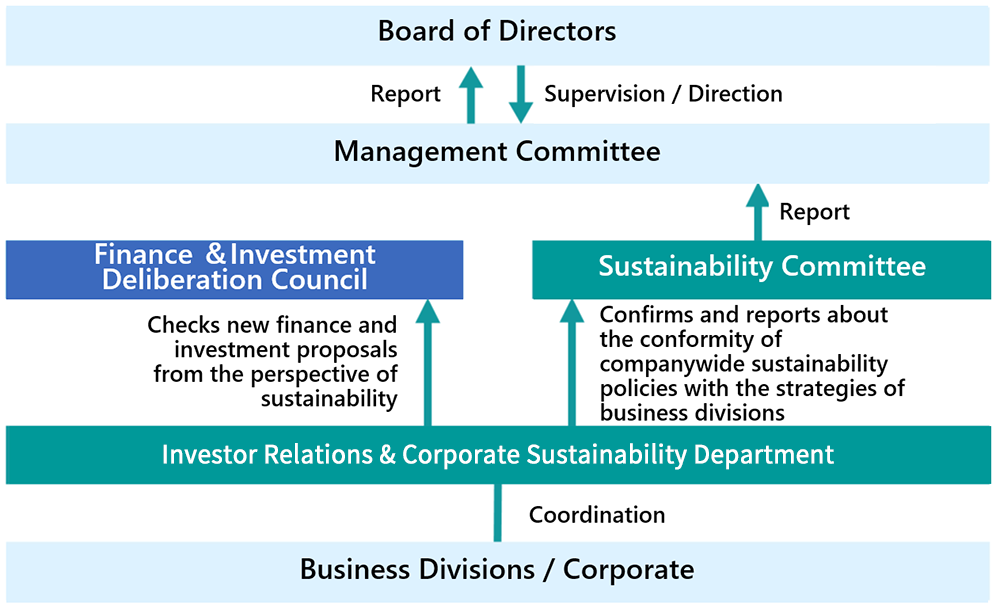
Sustainability Committee
The Sustainability Committee's activities include establishing company-wide sustainability-related policies and goals, constructing frameworks for their implementation, and monitoring various measures that utilize the ISO 14001 environmental management system standard.
Sustainability Committee Members (Current as of April 1, 2025)
| Committee Chair |
|
|---|---|
| Members |
|
| Observers |
|
| Secretariat |
|
Risk Management
Managing Environmental Risk for New Investment & Loan Projects
Prior to deliberating on new investment and loan projects, Sojitz requires the department applying for investment and loan approval to complete an “Environmental and Social Risk Checklist.” Using the checklist, the department confirms that they have conducted the required due diligence and taken all necessary measures to deal with potential environmental risks, such as impacts to biodiversity.
Initiatives
Analysis of Biodiversity
Business and societal activities are dependent on natural capital. At the same time, these activities also have a significant impact on natural capital. If all of the natural capital available across the planet were to be depleted, we would no longer be able to receive its benefits, and this outcome would have an adverse impact on the sustainability of both business and societal activities. Sojitz Group is no exception, as all of its wide-ranging businesses depend on natural capital. We therefore recognize the importance of preserving natural capital to allow for the sustainable utilization of resources.
Verification of Dependence and Impacts on Natural Capital
ENCORE* (Exploring Natural Capital Opportunities, Risks and Exposure) is a tool for evaluating companies’ dependencies and impacts on natural capital. Sojitz utilized this tool to verify how businesses in general are dependent on natural capital and the potential impacts that business can have on natural capital.
From among its business portfolio, Sojitz then identified 25 businesses with high dependency and impact as defined by ENCORE. ENCORE’s assessments indicate that in general, water is an area that scores high with regard to both dependencies and impacts. Sojitz therefore plans to conduct thorough reviews and detailed analyses of all its businesses that have significant water-related dependencies and impacts on natural capital.
- ENCORE is an analysis tool developed by the United Nations Environment Program Finance Initiative and other organizations, which is commonly referenced by financial institutions.
Environmental Protection and Social Contribution Initiatives in Mine Development and Operating Businesses
In mine development and operation businesses, Sojitz gives due consideration to environmental protection, health and safety management, and contribution to local communities. Mine development entails various risks, but we proceed with projects only after internally verifying that sufficient pollution and accident prevention measures are in place, which allows us to prevent risks before they materialize. Even after the mine is in operation, we work to ensure that mines are continuously operated with thorough safety and health management processes. We also strive to reduce environmental impact and promote environmental conservation through measures such as mine rehabilitation for all mines as necessary.
For example, at a Sojitz-owned open-cut coal mine in Australia we keep the topsoil that is removed for mining and use it after the mining is finished to cover up the mined area. We then work to restore the land to its original condition by planting new native vegetation. In addition, we carry out a range of social contribution activities with a focus on realizing a sustainable coexistence with surrounding communities.
In addition, Sojitz manages and operates Meteor Downs South Coal Mine in Australia, where it secures habitats both on-site and in part of the surrounding area for rare flora and fauna such as squatter pigeons that could potentially be affected by mining activities. Sojitz conducts all conservation activities in accordance with related laws and regulations and in line with approved conservation plans.
Wood Procurement Policy Initiatives
We selected and conducted a targeted survey of wood that makes up over 80% of our total purchased wood supply in terms of monetary value, using criteria including the supplier country’s risk level, the amount of wood purchased in terms of monetary value, and suppliers’ compliance with Sojitz policies, from among Sojitz Group’s approximately 1,500 wood-related suppliers. In addition to surveying traceability and assessing environmental and social considerations, Sojitz is working to provide educational training for business partners.
Read more
Sojitz and applicable Sojitz Group companies have acquired certification from the Forest Stewardship Council (FSC), an NGO that certifies sustainable forest management, and are utilizing sustainable forest resource procurement practices.
Read more
Bluefin Tuna Aquaculture Business
Sojitz established Sojitz Tuna Farm Takashima in 2008 in Takashima-cho, Matsuura City, Nagasaki Prefecture. Sojitz has since been engaged in the bluefin tuna farming business.
Sojitz Obtains SCSA Certification for Artificial Seedlings
SCSA certification is granted for producers of sustainable seedlings. Sojitz Tuna Farm Takashima has acquired SCSA certification, which ensures traceability of all the tuna shipped by the subsidiary as entirely artificially cultured tuna. Additionally, tuna farming that uses artificial seedlings can help to protect marine resources such as bluefin tuna as shortages have posed an issue in recent years.
Read more
Training Future Leaders through Sojitz’s Tuna Farm Aquaculture Business
Since May 2021, Sojitz has used its tuna farming business to provide students from Kyoritsu Women’s University and Tokyo Kasei University with an opportunity to learn about aquaculture and to experience the business environment firsthand as part of an effort to help train the next generation of professionals and leaders.
-
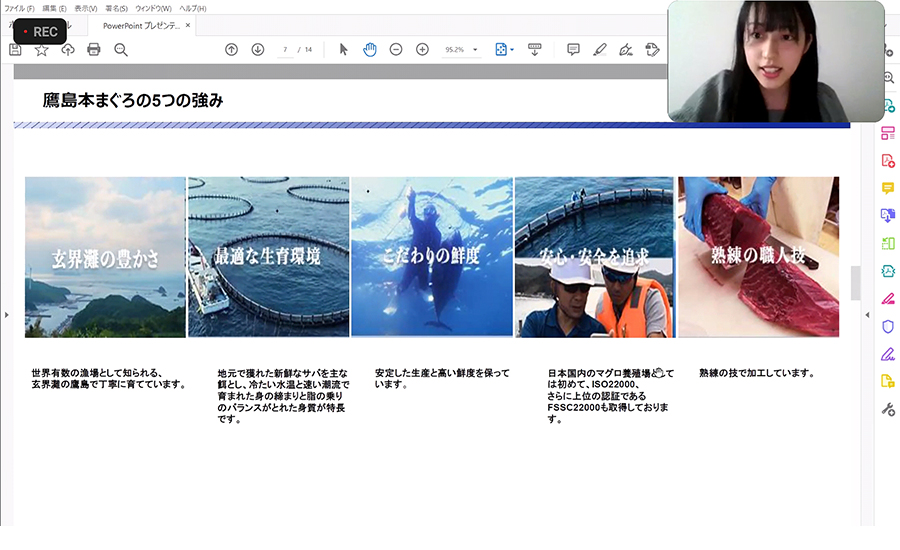
Educational activities for university students
(from an online lecture for students from Kyoritsu Women’s University) -
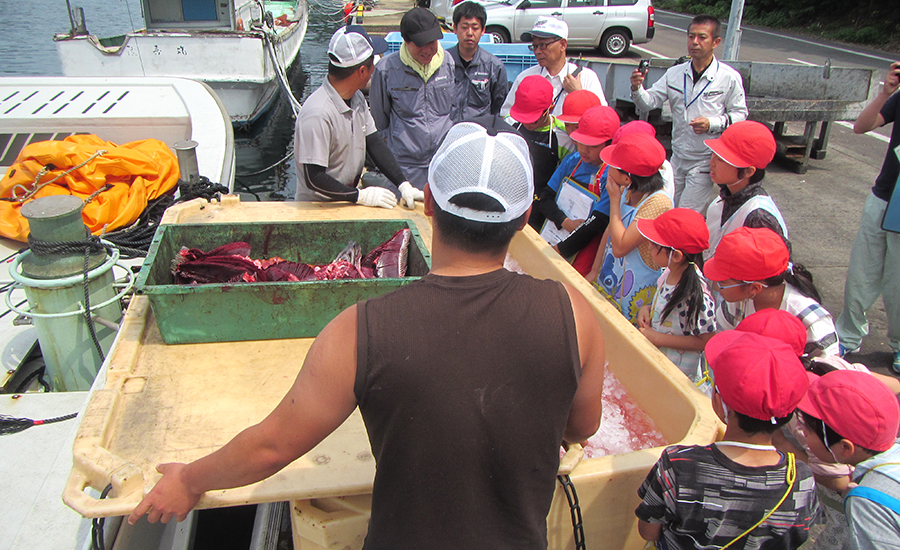
Elementary school students observe tuna processing
Read more
Marine Products (Fisheries) Certification
MSC Certification
Sojitz Food Corporation, TRY Inc., The Marine Foods Corporation and Dalian Global Food Corporation of Sojitz Group that handle marine products have acquired the MSC's CoC Standard.
MSC:The Marine Stewardship Council. An international non-profit organization that seeks the expansion of sustainable and appropriate fishery management practices in order to preserve marine resources for future generations, through its certification system and labeling program.
CoC:Chain of Custody. A certification recognizing proper controls of certified fishery products and the elimination of products from non-certified fisheries, ensuring traceability of certified fishery products throughout the entirety of the production, processing, and distribution process.
Environmental Education and Training
-
In order to improve employee understanding of environmental issues and of Sojitz’s Environmental Management System (EMS), Sojitz holds environmental trainings twice a year for all employees and for the designated environmental managers within each organization. In addition, Sojitz offers other learning opportunities including trainings for internal environmental audit personnel and an e-learning course on waste management laws that is available to all employees. Environmental information is also provided to employees through the company intranet.
Sojitz encourages employees to take the Certification Test for Environmental Specialists (Eco Test), a certification test administered by the Tokyo Chamber of Commerce and Industry. In addition, Sojitz holds riverside cleanup events along the Arakawa River for Sojitz Group employees and their families. This initiative aims to foster a culture of volunteering among employees and offer an opportunity to reflect on key environmental issues such as marine waste, microplastics, and the importance of conserving biodiversity.
After the cleanup events, Sojitz holds a follow-up workshop where employees can make accessories using the microplastics collected on the riverside. This hands-on activity encourages employees to consider the impact that environmental issues have on daily life.
-
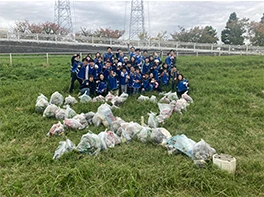
Collaboration with Our Stakeholders
Participation in TNFD(Taskforce on Nature-related Financial Disclosures)
Sojitz participates in the forum held by Taskforce on Nature-related Financial Disclosures (TNFD), which is an international organization established in June 2021 with the aim of assessing and disclosing biodiversity-related risks and opportunities for corporations and financial institutions.
Read more
Endorsement of the Declaration of Biodiversity by Keidanren and Action Policy
-
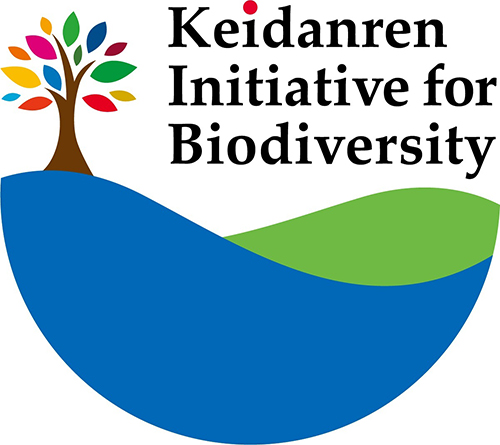
-
Sojitz expresses its support for Keidanren (Japan Business Federation) and Keidanren Committee on Nature Conservation’s Declaration of Biodiversity by Keidanren and Action Policy, which was revised in October 2018.
Read more
Participation in CDP Forests
Sojitz responds to the Forests questionnaire administered by CDP which evaluates forest management in the supply chains of companies. CDP is a non-profit organization that collects data from major companies across the world regarding their environmental strategies such as climate change-related initiatives. As a result of the 2022 questionnaire, Sojitz received a high score of management level (B) in Forests (timber).
Performance
Wood Procurement Initiatives
Sojitz established a goal to meet 100% wood traceability (0% of Level D) by FY2020, and the company has achieved this goal for six consecutive years from FY2018 through FY2023. Additionally, Sojitz has set a new target for FY2025 to ensure that 100% of the wood procured is environmentally conscious (Level A or Level B).
Qualitative Progress and Sojitz’s Target
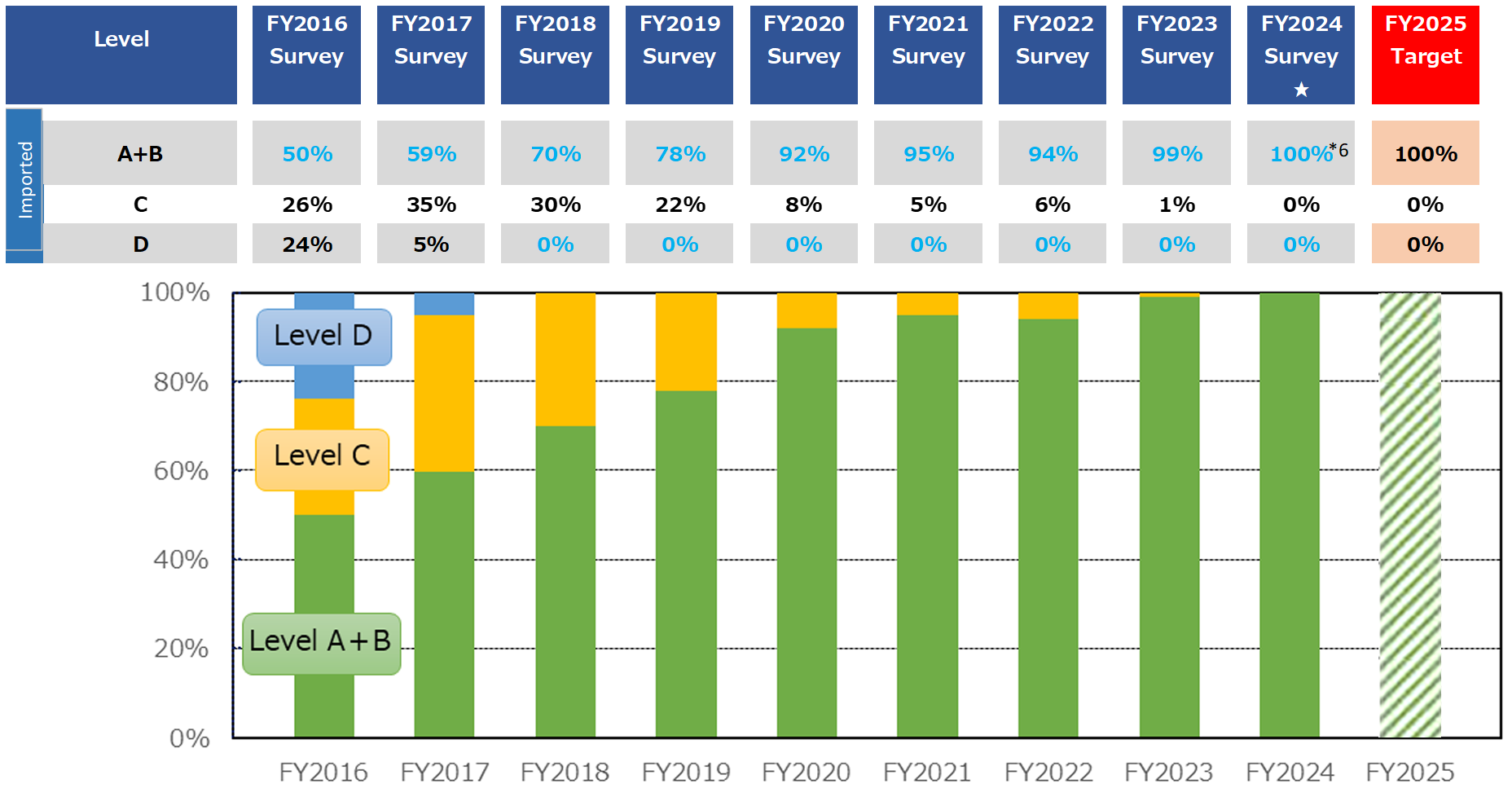
Read more
